#and if he dies she inherits part of his fortune by association? incredible.
Text
whether you ship steph with tim or cass, if bruce dies she is getting some of his will and that fact is incredibly important to me
#and to her probably. like she spends her whole two lives being a menace to him the best she can#and if he dies she inherits part of his fortune by association? incredible.#i also believe that even if you dont ship her with either of them and you truly believe they wouldnt give her any? jason would#stephanie brown#steph brown#tim drake#timsteph#cassandra cain#cass cain#stephcass#bruce wayne#batman#dc#dcu#batfamily
152 notes
·
View notes
Text
Ikemen Vampire - Jean d’Arc Route Summary Chapter 10
here is the tenth chapter!
to clarify again, I’m not very good at japanese so if anything is wrong or weirdly translated everything is on me.
of course there is going to be some spoilers so do not read if you don’t wish to know jean’s story yet.
*also little bonus at the end about Jeanne d’Arc real story! of course you don’t have to read it to understand his route in the game but it’s very interesting :)*

The Count tells MC the history of the war between France and England, also known as the Hundred Years’ War...
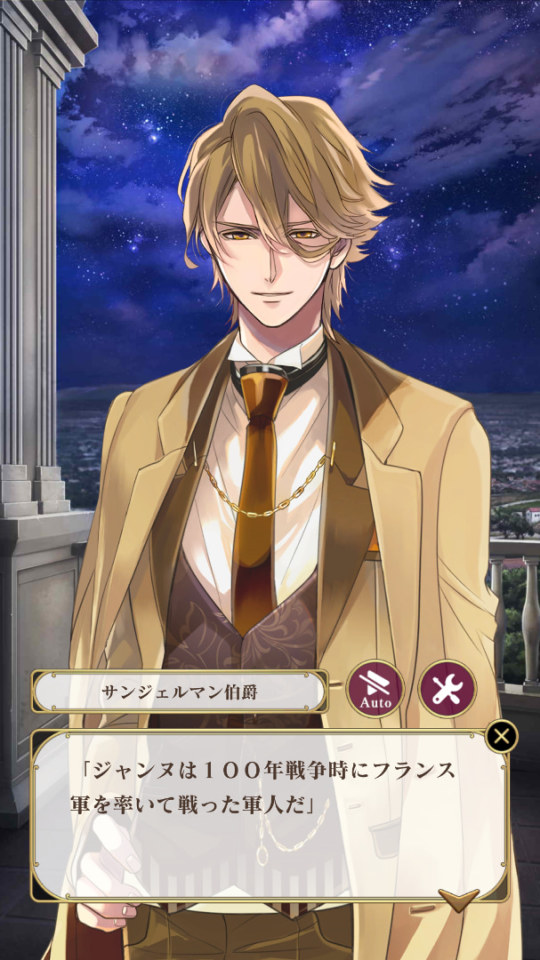
【 Comte 】 Jean was a soldier who led the French army during the Hundred Years War.
Jean fights for his country, France and defeats the English army. Jean d’Arc, soon after the defeat of the enemy, becomes a true hero for his people.
However, such glory won’t last for Jean :(
'The most tragic end of the world's heroes', as they say.
In the course of the battle, Jean was captured as a prisoner of war by the enemy. The King didn’t want to help him for some reason. 😡
And of course... 🙄
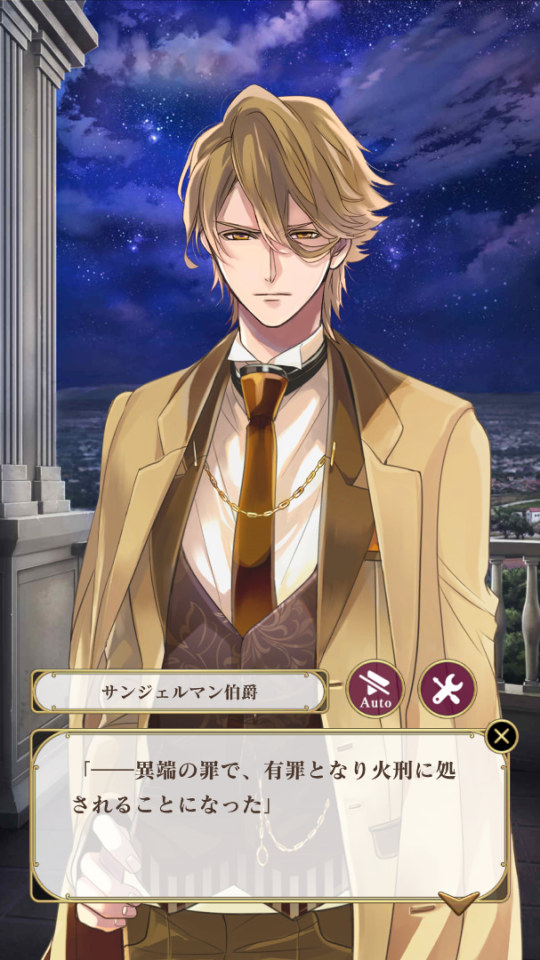
【 Comte 】 Jean was convicted of heresy and it has been decided that he would be sentenced to fire.
After Jean's death, the king ordered a re-examination of his treason and found him to be innocent, and he went down as a hero of France.
The fact that Jean never knew went down as a hero after his death and this won’t change the fact that he died as an innocent. The protagonist is angry because it doesn't make any sense.

From the bottom of my stomach, I feel a mixture of anger and frustration.
Here, the MC asks the Count a question.
“Why did he bring him back to life after such a death?”
There's something different about the Count returning the great men of the mansion and Jean.
The MC wonders if Jean really wanted the Count to bring him back to life.
Before the Count can answer, Jean appears, interrupts him, takes the MC by the arm and leads her away.
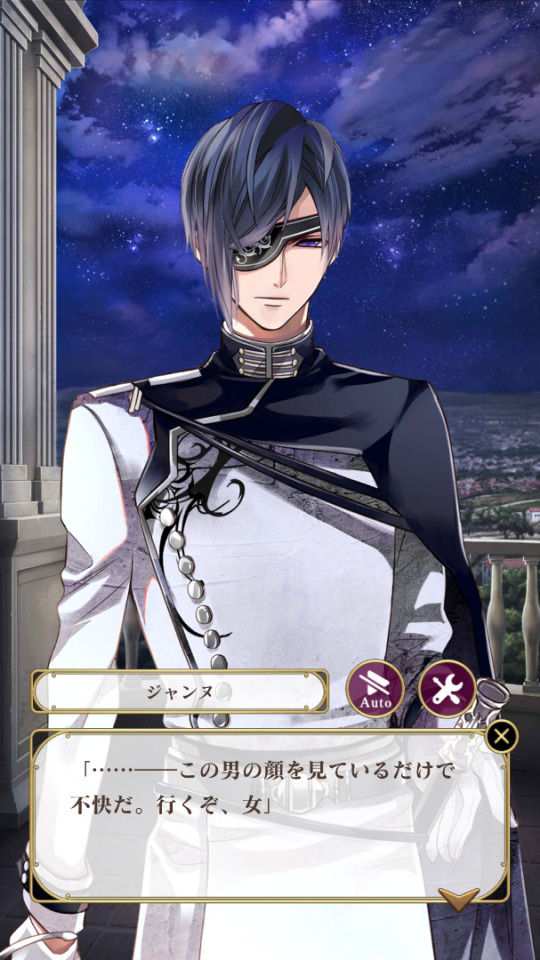
【 Jean 】 One look at this man's face is enough. I don't like it. Let's go, woman.
As soon as they arrived in the library, Jean seems to have calmed down a little lets go of the MC's arm.
The protagonist apologises for trying to find out about his past without his permission, but Jean says that's okay. Jean says it's okay, because his life has been written about in books anyway.
However, he says that he doesn't want the Count to tell her about it.

【 Jean 】 ...It's not enough to say I hate it, it's too much.
Jean says that he is not a hero and that he is no different from the children's book he used to read, The Ugly Duckling.
it hurts me so much that this is the way he perceives himself when he deserves all the love in the world </3

Jean's gaze fell on the book 'The Ugly Duckling', which was still on the table.
That’s it for chapter 10!

here is some real background info about the real Jeanne d’Arc! She is such a brave and interesting historical figure. The epitome of a real badass, fearless and powerful woman.
so, the hundred years' war, if we summarize as much as possible is a series of armed conflicts that began in 1337. which opposes the kingdom of france and the kingdom of england.
in 1328 at the death of king charles iv, the question arises as to who will inherit the french crown.
one then has the choice between the cousin of the preceding king philippe de valois and edward iii the king of england who by his mother isabelle is also a descendant of the french throne.
you can imagine putting an english king on the french throne, wasn’t seen very well.
edward not happy, which led to a succession crisis, which lead to the hundred years' war.
obviously this conflict, quickly overcomes a simple succession crisis.
it's a mess.
what you have to remember, is that the english are gradually invading part of the kingdom of france.
in 1415, after the battle of azincourt and the english victory, the english king henry v controls much of the north of the kingdom of france, including paris for that matter.
but it is far from being the only concern.
what you have to keep in mind is that the king of france at the time, charles vi, is reached at rather regular intervals of madness.
this obviously prevents him from administering the kingdom properly.
as a result, in parallel with the conflict with the english, a real civil war breaks out.
to find out who between his son the heir charles and his cousin the duke of burgundy will be able to take back the reins of the kingdom; the duke of burgundy is supported by the burgundians who will end up allying themselves with the english and the son of the king the heir charles is supported by the armagnacs.
but during this time, charles is betrayed by his own father who disinherits his son and after his death, gives the crown to the english.
i warned you that it was really messy.
and it is in this incredible mess that our jeanne arrives.
and where exactly does jeanne come from? from domremy.
she is also often called the virgin of orleans.
she is associated with the city of reims, but jeanne was originally born in domremy.
and where exactly is this place? domremy is this little town to the west of the city of the vosges department, on the banks of the meuse river.

isn't it pretty?


this is jeanne's birth house,
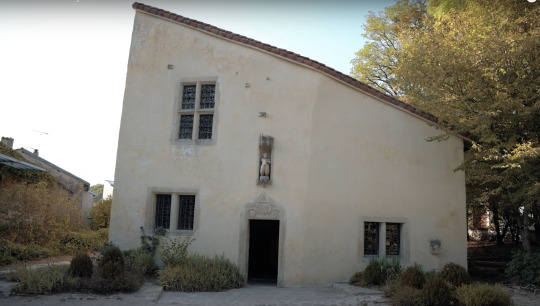
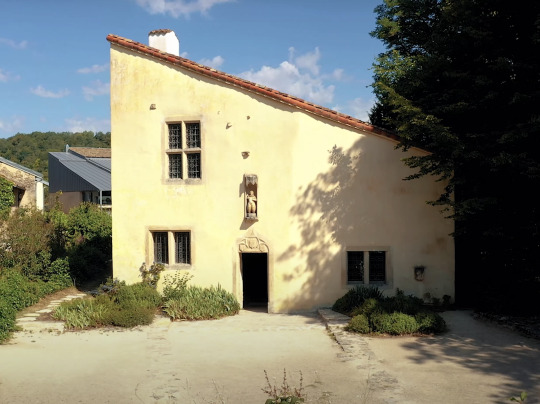
she would have been born around 1412. the building classified as a historical monument since 1840 includes in addition to a cellar, three large rooms originally used to house the whole family, her parents and four siblings.
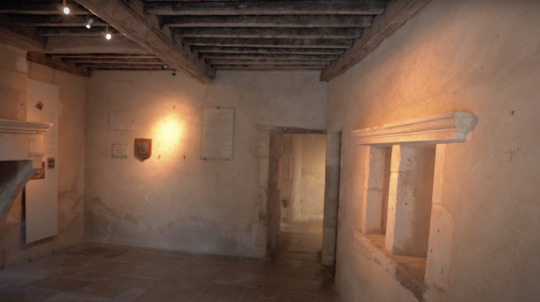
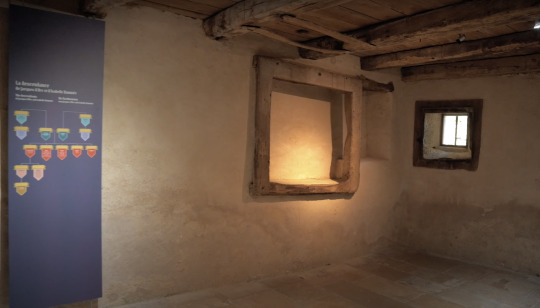
according to jeanne's trial, it is here that she would have learned to sew or weave which were two occupations of the young girls of the time.
her father was a ploughman, so she often had to look after the animals.
and since she is very pious she spent a lot of time praying.
she went on pilgrimage at least once a week, for example in the notre dame de bermont chapel, about three kilometres (as the crow flies) from her birth house.
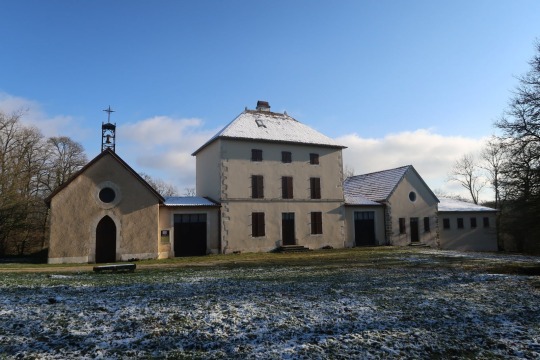
and jeanne d’arc, as you may have guessed, wasn't always called jeanne d’arc.
no, in history she has had different names and official nicknames.
there are of course the best known ones: the virgin of orleans, jeanne the virgin or even just the virgin and in the vicinity of domremy she was also called the jeannette de rommée, in connection with her mother's name. she has even signed several letters with the name jehanne.
and it's even more complicated if you're interested in her surname “d'arc”.
which was originally written darc, without the apostrophe. here again there have been many variations, and i'll mention a few of them: tarc, dars, darx and even d'ailly or daly according to the phonetic transcription of her name, with a lorraine accent. from there we move on to duly, then du lys.
when the king ennobled jeanne and her family, it is written on the deed, la dame du lys in reference to the royal coat of arms.
this is the magnificent bois-chenu basilica, which was built between 1880 and 1940 in honour of jeanne.

and for the record, this incredible basilica was sometimes considered to be the place where jeanne would have heard voices.
however if we refer to the trial, it is in her father's garden, near the house, that jeanne would have started hearing voices, celestial calls, coming from saint catherine of st. margaret's and the archangel saint michael.
the divine mission entrusted to her was very “simple”.
she was only commanded to be a cavalier, to cross a kingdom occupied by the english to go and find the future charles vii and convince him that she is the one sent from heaven.
to help him to take his place on the throne by her coronation in reims.
to show him how to liberate the kingdom of france, of the english presence.
it seems to be an easy enough mission for me. 😅 (nope)
so obviously you can imagine that the people didn't take her seriously right away. it took a few years before she managed to convince the world that she wasn't completely crazy.
- jeanne?
- yes?
- this is the voice.
- is someone talking to me?
- you are the chosen one, jeanne, join me.
- yes, i'm coming.
- i hope you like human barbecue. (ok i'll stop :/)
how is the legend of jeanne forged? how does one go from being a peasant girl eager to help, to jeanne of arc, heroine of the kingdom of france?
this is le centre d’interprétation (the interpretation centre), which is just behind jeanne of arc's birth house and retraces her youth and adventures.


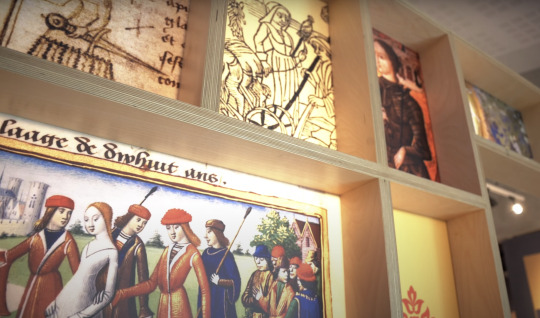
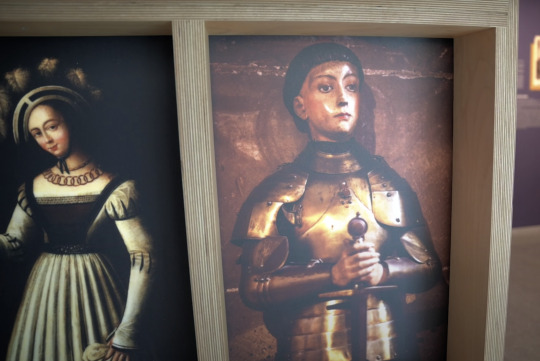

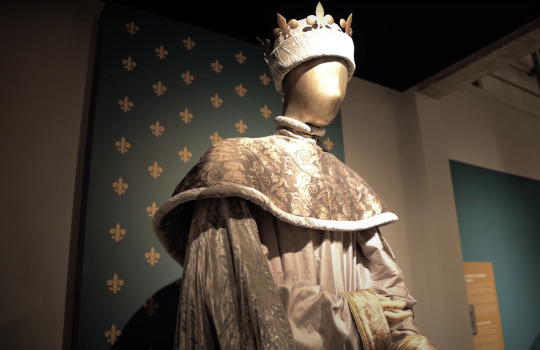
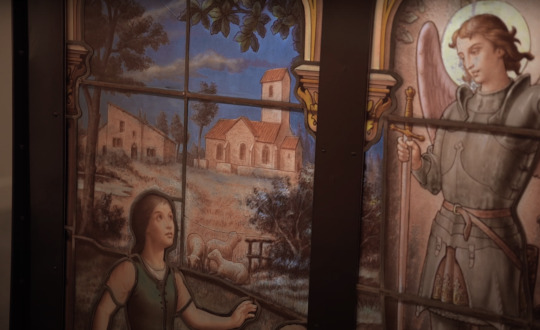
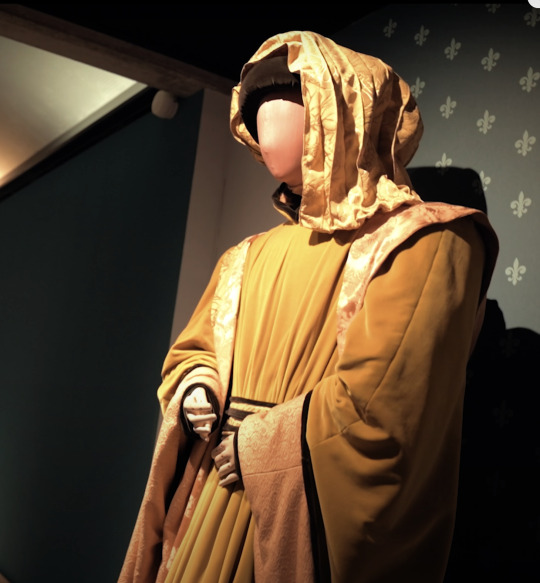
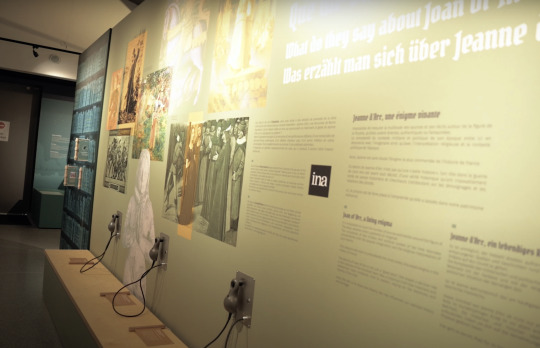

her journey is incredible, at 17 years old, jeanne can't stand not doing anything anymore, she has been hearing voices urging her to act for four years now.
so she decides to return to the châtellenie de vaucouleurs, to meet captain robert de baudricourt, one of the king's faithful followers and after several vicissitudes, she manages to convince him. it wasn't easy, i remind you that her main point was that she hears voices. but yeah, he finally agrees to send her with an escort, join the heirn in chinon.
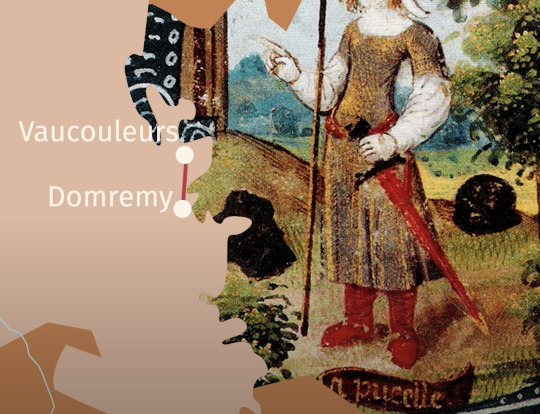
the journey is quite long and above all risky, we are talking about more than 500 kilometres and in this period of turmoil, the dangers were quite present especially if you look at the map, one realizes that the small expedition crosses areas not controlled by the enemy coalition.
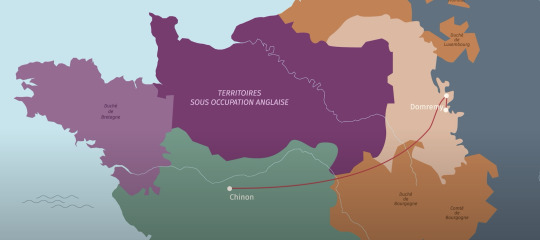
fortunately, everything went well for jeanne, who arrives at her destination on march 1429 and gets an audience with the heir two days later. he was quite suspicious of this young woman at first, who claims to hear divine voices but according to the story she made a revelation to him that we don't know which eventually convinced him.
for the entourage of the suitor of the throne, it's not that simple and you can understand them, betting on jeanne is a little bit like a poker game. so they insist that she will be given a few interrogations, she is questioned about her life, about her morals and finally confidence is established, she is equipped with military equipment. she then undergoes mini combat trainings and here we go, her dream is about to come true, she joins a supply convoy in blois and on april 22nd, with more than 4000 men, she is headed for orléans.
the arrival of jeanne of arc changes many things.
her faith, her confidence in victory gives hope to the soldiers and to the inhabitants, who are filled with new energy. they manage to win in less than 10 days, 10 days and the english are obliged to give up their plan, which consisted of taking the city and then attacking the south of the loire.
jeanne who comes out of this battle with this image as a victorious, ultra badass woman and just earned her nickname... la pucelle d'orléans (the virgin of orleans).
thanks to her victory in orleans, jeanne thus becomes a kind of national heroine. she represents by her fame and her qualities, a not insignificant asset for the heir in his fight against the english and the burgundians.
but what makes a real difference is less her qualities as a war strategist and more her ability to charm and to galvanise the troops and the inhabitants along the way.
it's quite simple, before jeanne's arrival, the english had a reputation for never losing their invincibility.
and jeanne achieves the feat of restoring confidence in a possible victory.
it gives the impression to the troops that they are going to receive a kind of divine help and it changes everything in the soldiers' minds, all the more so because before her arrival there was a prophecy, who said that a virgin would help defeat the english so when jeanne arrives, everyone thought "it's ok, we're saved"!
jeanne persuades the future king to start a ride to reims who is in the middle of enemy territory, to be crowned.
jeanne thus succeeded in carrying out one of the following missions which were supposedly entrusted to her by the voices she hears; in other words, since she has succeeded, she is necessarily an envoy of god, and that for the mood of the troops, it makes a huge difference.
unfortunately after the time of victories comes the time of defeats.
after the coronation, the king and jeanne no longer really agree. she is convinced that her mission is to keep the english out of france.
the king, for his part, is longing for a little rest.
for example, he does not feel at all capable of taking back paris, while jeanne, a little bit stubborn, goes there anyway and suffers a failure.
on top of that she is wounded, she gets a crossbow arrow in her thigh, moreover, she breaks her sword which had for all victories...
it's a bad sign.
some people think that the virgin is abandoned by god. some time later jeanne went to compiègne, a city besieged by the burgundians and by some english contingents and once again it goes wrong, she is taken prisoner in may 1430, by the burgundians.
she tried to escape, but all her attempts failed and in november of the same year, she was sold to the english. jeanne is then taken to the castle of rouen, where members of the church judge her for heresy.
the trial was to say that charles vii was crowned thanks to a witch, she is also blamed for everything and anything, for dressing in men's clothing,
for deferring directly to god's judgement without going through the church, for hearing the voices of demons and not of saints.
jeanne really plays her life on each of her answers, in addition, she faces accusers totally committed to the english cause on her own when she was only 19 years old.
moreover, the witnesses are obviously not chosen at random, everyone who could speak up for jeanne is under pressure. everything is being done to ensure that she is condemned. finally, she ends up at the stake, on the market square, and we make sure there's nothing left of her body, to prevent it from being turned into holy relics.
and then after the end of the hundred years' war, i.e. almost 25 years later, the church reverses this first court decision. king charles vii wants to wash away the insult that was done to him through this trial and he pushes jeanne's family to ask for a review. pope calixtus iii agreed and jeanne was rehabilitated in 1456. the investigations carried out are more serious, many of jeanne's contemporaries jostle to plead in her favour and even people who had once spoken badly of her finally return to saying good things about her.
the first judgement is broken and the young woman's memory is rehabilitated.
an unusual little fact in the end - many people have not been able to admit that the story of the virgin ends up on a pyre. for them it was impossible, this story was too beautiful, this too extraordinary woman.
and it went far enough that people found stories of women, who a few years later claimed to be the real jeanne.
just imagine them saying stuff like "oh yeah, yeah it's me i didn't burn at all, my face has changed a little bit but it's me, i assure you, believe me, really".
a certain claude des armoises is said to have pretended to be her, in the metz region. after having acquired a certain renown, having been given gifts by former relatives of jeanne; she even went so far as to meet two of the virgin's brothers, who (hold on because it's completely insane) believed her.
they really believed it was their own sister who had died at the stake.
it's a crazy story!
well, we don't really know if they really believed it, or if one pretends to believe it for financial reasons for example.
in any case, this woman, who was talked about everywhere, is unmasked by the king himself, so that this fraud can be stopped.
in the end, i find this story quite unusual.
here are the friends!
i hope it wasn’t too long to read (it probably was) and that you have learned two, three little things on our dear jeanne d’arc. after all, she is one of the most famous women in history!

#ikemen#ikemen games#ikemen series#ikemen spoilers#Ikemen Vampire#ikemen jean#IkeVamp#ikevamp jean#Jean#Jean D'arc#jean route#ikemen vampire jean#jeanne d'arc#history#france#my translation#jean all chapters
59 notes
·
View notes
Text

Full Backstory.
Warning: Contains mentions of parent death, sibling death, child neglect, murder, abuse, torture and mental health stigma. While the following story is not overtly dark throughout, the above subject matters are strong underlying themes. You have been warned.

Growing up.
Valere was born in Calais on February 22nd, 1752. He was born to a Catholic family and was christened Valere Étienne Pierre Lavigne.
He was born to Etianne Céline Claire Forté, the daughter of an upstanding middle-class family from the French commune of Villefort, and Claude Pierre Lavigne, a born and bread Parisian who had recently relocated to Calais.
Etianne and Claude married for mutual benefit and stability. However, it wasn’t until after their marriage that Etianne would discover Claude’s deception, by which he grossly exaggerated his wealth. While he had once come from a wealthy family, he had recently been estranged and cut off and acquired sizeable debts. This resulted in Etianne and her family having to be the soul financial supporters of the marriage.
During their marriage, Claude used their allowance to open an export branch of Calais lace. He christened his company Lavigne Lace and at first, things seemed to be going well.
However, it didn’t take long for customers and competitors alike to become wary of Claude. Lavigne Lace was quick to garner a reputation for shady production and shoddy quality, along with rumours of overcharging and client’s money mysteriously disappearing.
Claude obsessed over Lavigne Lace, seeing it as get-rich-quick scheme and a way to spite his estranged family.
Meanwhile, Claude and Etianne’s children were born. Laurent came first in 1740, followed by Valere six years later and finally, Céline three years after that. Sadly, Valere’s time as a middle child was cut tragically short after his little sister, Céline, died of childbed fever, leaving behind just him and his older brother.
Claude disliked children in general. His motivation for having them in the first place was financial as he was in need of an heir to inherit his precious business.
As such, Valere was much closer with his mother during the first years of his life. She was a gentle woman who did anything she could to protect her two boys against Claude’s temper, which worsened once the children came along.
When Valere was six years old, Claude had taken Laurent out of town to coach him on business matters, as he so often did. During this time, Etianne contracted a severe case of cholera. With Claude being too stingy to pay for domestic help, the young Valere was left alone with her.
He tried his best to nurse her but ultimately didn’t know what to do. All he knew was that drinking water was important when treating fever, unaware that the water had caused the problem in the first place.
Etianne was dead within hours.
This left Laurent and Valere alone with Claude, who took care of the matter swiftly. The Coroner confirmed the cause of death and she was buried within days. They never spoke of the incident again.
In the years following, Laurent, who had dreams of becoming a painter, was stuck as the unwillingly heir to Lavigne Lace. As the first born, he was the more favoured of the two while Valere was more or less considered ‘the spare part’.
While endless pressure was forcefully placed on Laurent, Valere was neglected entirely. Laurent grew to deeply resent his father’s business and would practice his artwork in secret. Meanwhile, Valere, who was academically inclined, grew equally resentful as he watched his brother seemingly squander opportunities that he could only dream of.
While he had no more interest in his father’s shady business than Laurent did, he did feel that he was much more equipped to make use of the expensive education Laurent was receiving. While Laurent disliked what was being forced on him, Valere became increasingly embittered from envy of it.
Laurent did what he could to protect his little brother in the absence of their mother, with Valere often being used as a household lackey and an outlet for Claude’s temper. However, despite Laurent’s best efforts, Valere’s hurt and jealously caused by their father’s treatment of them eventually drove a wedge between the two brothers.
During all this, while Valere and Laurent were growing up, Claude was imprisoned multiple times for crimes such as debt, fraud and embezzlement, during which time the task of bailing him out would fall to his two sons.
While Laurent was content to leave him locked up, Valere was usually the one who would through on this task. Not because he particularly wanted him out anymore than his brother did but more because he saw these incidents as an opportunity. They were the only chances he ever got to flex his smarts a little, as well as learn and apply a wealth of new skills.
Pulling strings through the use of his father’s pre-established business connections, Valere found ways in which to acquire large sums of money in short amounts of time. During this time, he learned the ins and outs of basic business and accounting skills. Also not wanting to make their family situation any worse, he supplemented these skills by reading up on the law so as to complete these tasks in as legally sound a manner as possible.
By the time he was eighteen years old, Valere was able to manipulate the system with such dexterity that it would doubtless provoke envy from even the most upstanding of lawyers.
Shortly after Valere’s nineteenth birthday, however, Claude Lavigne got himself into a situation that neither of his sons could weasel him out of. He was charged with mass embezzlement, robbery at knifepoint and the subsequent murder of two of his victims, both of whom he owed money.
His trial was held the very next week, in which he was convicted of all charges and sent to the scaffold shortly after.
To this day, neither of his sons know whether or not the conviction was truly correct.

Freedom.
Following their father’s death, both sons left Calais. Valere took what savings he had and left for Paris more or less immediately, while Laurent stayed behind for a short while so as to formally shut down Lavigne Lace for good, before also leaving Calais to go travelling.
With all that had happened, upholding justice and fairness had become something incredibly close to Valere’s heart. He burned to acquire the wealth and success his father dreamed of for himself. However, as someone who had grown to detest unfairness, he wanted to attain success the opposite way in which father had attempted to do so. Valere vowed to himself that he would live fairly and justly and be much better off as a result.
Eager to pursue this legacy, Valere decided that law was his calling and removed all obvious connections between him and his scandalised father, so as not to face any prejudice upon entering the profession - the last thing he needed was any more obstacles. And so, just before leaving for Paris, he legally removed Lavigne from his name and replaced it with Forté, his mother’s maiden name and the name of a just and respectable family. That and truth be told, he just liked that name a great deal better. For many reasons.
For the time in their lives, both sons were free...

Rise.
Upon his arrival in Paris, Valere found employment with a Parisian law firm as a clerk and courtroom scribe. Placing all his passion and fervour into his new employment, he climbed the ladder rapidly and within two years, he had gained official advisor status.
Despite achieving this huge career leap at such an uncommonly young age, Valere wasn’t even close to being satisfied. He continued to work relentlessly and slowly but surely, his name became more and more known within the industry. He gained a regular clientele who became increasingly widespread and upstanding the more Valere’s reputation grew. At last, Valere was seeing the fruits of his labour, earning good money, a good name and finally, a training contract from his law firm with which to become a fully licensed solicitor.
As he became more and more known throughout France, news of the audacious newcomer eventually reached Versailles. Intrigued, King Louis requested to meet him, an opportunity that Valere grasped with both hands.
During his visit, Valere turned up the charm, his time spent around the bourgeois in recent years having taught him a great deal in terms of courtly etiquette.
Several members of the aristocracy took an immediate liking to him, which in turn gained him an entirely new clientele. Now with a name not just throughout France but within the Royal Court, Valere eventually gained the ultimate prized client; the King himself.
As a result of his association with the Royal family, Valere’s fame and reputation doubled, as did his fortune. Within five years of leaving home, he had acquired wealth and success beyond his father’s wildest dreams and had done so via just causes.
As time passed, Valere continued to work hard and gain favour within the Royal Family.
For his services, the King awarded Valere the title of Valere de Villefort, after the place from which Valere had claimed to have come from, alongside the rest of the Forté family. This was a lie put in place as a further precaution against his unfavourable past, now fearing association with the Lavigne family more than ever.
Shortly after this triumph, the King, now considering Valere a valued member of his court, announced that he was to be matched with Lady Charlotte Howard, the daughter of an English aristocratic family.
This marriage had been arranged as a minor political statement; a way of trying to improve Anglo-French relations by show of a union.
Valere was full of reservation upon hearing this news. This was partly a result of fear due to his latent homosexuality (of which he was vaguely aware but had always tried to put out of mind). Nevertheless, he agreed to match anyway, thinking it the best thing to do given the circumstances.
Despite the marriage having been decided for them, Valere and Charlotte took full advantage of the courting period. Over time they found they complimented one another well and very much enjoyed each other’s company. The two of them grew close and each came to love the other a great deal. Although neither party ever conveyed just how terrified they were of the wedding night, each for a very similar reason.
Alongside this, it is arranged that Valere would be royally knighted and acquire the official aristocratic title of Chevalier de Villefort, as well as being offered the job of the King’s right-hand advisor once his solicitors license was finalised.
At this point, it seemed that life for Valere was a bed of roses.

Fall.
During his time at court, Valere crosses paths with a professional rival by the name Gustave Beaumont. While rivalry isn commonplace within the competitive worlds of both law and court life, Beaumont stands out.
There was something about him that made Valere uncomfortable and he had been aware since their first meeting that Beaumont had he taken a disliking to him. However, Valere decided to pay him no mind. He stayed out of his way as much as he could and was civil when their meeting was unavoidable.
Beaumont was nearly two decades older than Valere and had been working to secure the position of right-hand advisor to the King. Having been in the business far longer than Valere, he viewed him as little more than a young upstart and was not in the least bit concerned of ever being overtaken by him.
One can only imagine the shock he felt when he one day woke to discover that Valere had done exactly that; livid would have been a gross understatement.
Unable to accept the loss, Beaumont deliberated for weeks on what to do. He did what he could to try and sway the King’s opinion and overturn the decision but ultimately failed. Exhausted of options, he eventually settled upon the most simple yet most risky solution for dealing with Valere; he would simply have to get rid of him.
To do this, he would have to change tactics. Rather than trying to convince the King of his own merit, Beaumont would have to instead convince him of Valere’s faults.
Through both bribery and exploitation of professional jealousy among some of his other piers, Beaumont gathered together a small group of allies who set about the task of researching Valere’s history, trying to dig up any dirt they could to help bring about his fall from favour.
This being one of the oldest tricks in the book, they didn’t hold out much hope; this was merely a place to start.
As such, they were left very pleasantly surprised when they discovered a dubious connection between Valere and a painter named Laurent Lavigne. A little more digging and Valere was quickly connected to a shady export company named Lavigne Lace.
From here, Valere de Villefort’s upstanding persona crumbled piece by piece. With one connection leading to another, Beaumont gathered himself of goldmine scandals and unfavourable incidents, many of which would malleable to his will. After all, the very best lies always contain little fragments of truth...
Blissfully unaware of Beaumont’s proceedings, Valere was summoned to court a few months later. He was lead into a room attended by the King, the royal family and piers of the realm, in the middle of which he was ordered to kneel. Confused, Valere obeyed.
It was here that Beaumont presented his case. He began by exposing the various scandals of Valere’s biological family, from the mass embezzlements to the eventual murder trial. Using little nuggets of innocent truth, he was able strongly fabricate Valere’s involvement with his father’s criminal activities and the methods with which he acquired the money frequently used to bail him from the debtors prison.
From here, Beaumont painted a grim picture of Valere as a pathological liar, who was masterfully deceptive and doubtlessly malevolent in his intentions.
This alone was a huge blow to Valere’s reputation and yet Beaumont still wasn’t done. Having spent the last months weaving together a complex but convincing narrative via grossly twisted evidence, he was able to convincingly accuse Villefort of murdering his mother when he was a child.
In doing this, Beaumont had finally hit the King’s weak spots. A paranoid, melancholic and somewhat naive individual, a case such as this was exactly the thing needed to finally sway the King’s mind.
Sure enough, sucked in by Beaumont’s unbridled charisma, the King became convinced of his arguments and was heartbroken by the supposed betrayal.
Furious, he refused Valere a fair trial and convicted him on the spot.
Usually, a case such as this would result in one being sent to the scaffold. However, due to the worst of the proposed crimes having supposedly occurred during Valere’s childhood, paired with the Royal family’s sentimentality towards him, the King thought twice before sending Valere to his death.
Despite feeling fury and heartbreak towards the young man, he was unable to accept that someone he had trusted so entirely could possibly have been an inherently evil individual; the one thing at which Beaumont had failed to convince him.
He proposed that the crimes committed were “not a result of evil nature but rather of being under the influence of evil; a possible demon of the mind that may well be expunged with proper treatment”.
Valere was exempt from the death penalty and instead sentenced to being involuntarily committed to the ‘House Of The Insane’, the period of which was indefinite.
And so, having only recently acquired his much sort after solicitor’s qualification and with less than a fortnight before his wedding was due to take place, Valere carted away to the so-called ‘hospital’, where he was locked up, abused and tortured alongside hundreds of other unfortunate patients who were deemed ‘unsound of mind’.
Wishing simply to move on and not dwell any further on the matter, the King decided against making any public announcements regarding Valere’s situation.
This worked to Beaumont’s advantage. He had his allies spread the gossip that Valere had been charged with matricide and, while trying to resist arrest, had fallen into the Seine and drowned.
Despite Valere not receiving the death penalty as Beaumont had hoped, he was nevertheless confident that his false death in the public eye would be more than enough to keep anyone from looking any further into the matter.
Valere de Villefort was dead and that was that. Nothing more to say.

The Coroner Calls.
Eleven months after Valere’s detainment, Versailles received a letter from Calais.
Beaumont, now having taken the place of the King’s official right-hand advisor, was the first to read the correspondence. And its contents shook him to the core.
The letter was from a Coroner named Jaques Monet, the very same Coroner who had examined the body of Etianne Céline Claire Forté Lavigne.
Having heard the rumours behind Valere’s death, Monet had written in to reconfirmed that cholera had been the direct cause of Etianne Lavigne’s death, owed to an undetected sewage spill and subsequent build-up within the water system.
In his explanation, Monet placed strong emphasis on the fact that Madame Lavigne had not been the only one in the area to have either died or become severely ill as a result. With everything backed by records, Monet stated at the end of his letter that he would willingly testify the information if necessary and as such, it was strongly advisable that the late Monsieur Forté be granted a full, posthumous pardon.
Made both terrified and furious by Monet’s letter, Beaumont announced that he would travel to Calais immediately and track down the Coroner, so as to ‘deal with him swiftly and appropriately’. Meanwhile, Beaumont ordered one of his old co-conspirators, Blaise Dupont, to the hospital in order to ‘take care of Forté in the very same fashion’.
Equally frantic from fear of his own involvement in the lie being exposed, Dupont agreed and left immediately for the hospital, only to be ruefully informed upon arrival that the staff had lost the patient in question.
Assuming this meant Valere had succumbed to the brutal ‘treatments’ to which patients of these facilities were frequently subjected, Dupont left the hospital in a state of relief, glad that they now had once less thing to deal with.
Terrified of the repercussions, the hospital staff allowed this to play out, deciding not to clarify precisely what they meant by their use of the word ‘lost’...
To be continued...

Upcoming Verses:
In between.
Resurgence.
Vive la Révolution~!

0 notes
Text
Liza Wight
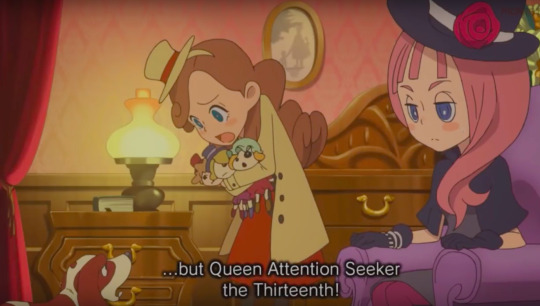
“It’s Miss Seeker! First name, ‘Attention’!”... Actually, it’s Liza Wight. Liza could be short for Elizabeth or Eliza. It means ‘either oath of God, or God is satisfaction’. Thanks Google
We’ve had two Queen Elizabeth’s in British history, one of whom is the current and longest reigning monarch. Probably just a coincidence, but Kat calls Liza “Queen Attention Seeker the Thirteenth!”
While Liza certainly enjoys scaring the living daylights out of people, she doesn’t do it out of malice or to fuel her own ego.
She’s been lonely - feels like she can relate to wandering ghosts in that way...
Her parents died in a airplane accident when she was 18, robbing her of any relatives but granting her the family inheritance. Her only companion was Wooooster the butler.
Aged 20, she’s the youngest of the Seven Dragons. (There are some... questions on that below the spoiler cut.)
Madame Doublee is her neighbour and they’re in close contact, so Liza isn’t utterly isolated. Double reveals that Liza has always been ‘rather quiet’, but she’s become even more withdrawn since her parents passed away.
Wooooster claims his young mistress is of a ‘solitary disposition’ and doesn’t leave her home very often.
Rumour has it that her house has been cursed since Mr Wight died.
A young orphan associated with the supernatural - often the subject of gossip - who doesn’t get out much. Where have I heard that before?
Despite this, she specifically requests Kat and Emilianna help. She’s quite humble, asking them to call her Liza.
Using her incredible craft skills, she transforms the ‘ridiculously large’ Wight Residence into a haunted house.

She invites investigators to her house, only to give them a fright. (This included a shaman and a spiritual medium. (Hey, Wight sounds a lot like Wright...)
One reason she suggests for the “ghost’s” presence is that they might be ‘departed souls with a grudge against her family’. HMMM...
After figuring out Liza’s game, Kat promises she can always call on her.
However, Liza doesn’t hang up the ghost sheet. She puts on ghostly performances and parties for her Super Naturalist club friends. (Hopefully, Granny Riddleton will even join in.)

She owns a projector... which she probably uses to watch too many horror movies.
Collects/Makes dolls and puppets.
More of a night-bird than a day bird.
Feels comfortable when there’s a chill in the air... or maybe that’s just to conceal her secret cellar.
She has to spookiest, but sweetest butler in the world.
Really, she sounds more adorable than terrifying.

“Boo!”
BEWARE, POWERLESS MORTALS! Below be spoilers for the final case of the game!
So, going back to that line about ‘departed souls’ with a grudge against Liza’s family. Could it be... foreshadowing for the millionaire’s conspiracy and what happened to the Richmonds? Miles/Ernest definitely holds a grudge for the Seven Dragons.
This is where I have a bit of a problem. Liza is only a year older than Miles. As Mr Fullhold points out:

Liza wasn’t a Dragon when Ernest’s family lost everything - that was her father. And from how Liza talks about her ‘ridiculously large house’, you get the impression that she’d much rather not have inherited the place. Still, she feels it’s her duty to take up her father’s mantle and responsibility as the sole surviving heir of the Wight family.
Sure, it’s not like Miles intended to hurt the Dragons with his game... He’s just going to take away all of their wealth and send them down the ‘Road to Ruin’. You could argue the fortune matters even less to Liza and she won’t be that hard-done by the scheme. She recognises what’s important, now that she has moved past the loneliness caused by her parents’ deaths.
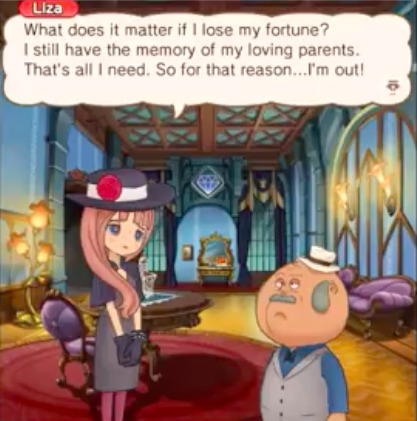
She’s able to accept this... whereas Miles is still bitter and furious at the tragedy his family has faced. It highlights what a noble character Liza truly is.
I’ll give Miles/Ernest this: He’s awfully quiet during the epilogue of Case 5. He has nothing to add, except a quick “I say...” when he sees the photo of Liza with her Super Naturalist Club. Is he, perhaps, considering the losses his scheme will bring to Liza? Does he believe that by taking away her fortune - and most likely her mansion along with it - she will lose the new friends she’s found? What he fails to realise is that her new friends aren’t there to leech of Liza’s money. They like her for her ghost-obsessions, her crafts talents and her passion for the supernatrual. Yes, the big spooky mansion is a bonus, but they can hold their gatherings anywhere.
Miles needs to realise the true meaning of an enriched life... and he does in the end. But I hope he especially apologised to Liza, who had no part in the conspiracy.
#professor layton#lmj spoilers#katrielle layton#character of the day: Liza Wight#Mr Fullhold#Layton's Mystery Journey#Ernest Greeves#Emilianna Perfetti#Wooooster#Madame Doublee#I think the game's been out long enough to avoid spoiling Case 5#Arianna Barde
23 notes
·
View notes
Text
The Circle of Life and a Fur Hat
My grandmother died on 29 December 2019 and I inherited her fur hat.
Her death came as a shock to no one. She has been dying for what felt like years. And yet. She is the first close relative I helped bury. A few minutes after I learned of her passing, I was sent to summon my sister so my father could inform her, and I was asked by our elderly neighbour – whose inevitable death I dare not ponder – if I had loved my grandmother. I paused before my quiet reply – a shy “No.” – because I never bonded with her in a way required for love to persist. She was a complicated woman and suffered from dementia during the last five years of her life.
Last June we all thought it could happen any day. I went to see her with my father and he read Psalm 23 to her. I sobbed like never before in my life because this circle of life business – it’s so much easier said than done.
My grandmother was a multi-layered woman. Complex. Stubborn. Industrious. Meticulous. Peculiar. Well-dressed. Resourceful. She did not complain. Despite her poverty, she was generous within her means. She could whip up a fulfilling meal out of thin air. But she could also be cruel in an impossibly stubborn and often pointless way.
We all carry parts of her within us. And that has made for volatile family relations. So, when death comes, it’s inconvenient, but I reckon death usually is. But we deal. As one does. We all descend onto our hometown and I brace myself for tension and explosions. But none come. None.
It’s all tears and hugs and occasional laughter. I am given the chance to see her, in the casket my father built – painstakingly over many months. A masterpiece destined to never be seen again. I admire him beyond words for that. She lies there and is unrecognisable. My aunts did an incredible job bestowing upon her corpse the little tokens she was best known for. It’s perfect and touching and I choke up for the first time. We stand around her and it’s as beautiful as a heart-breaking moment like that can be beautiful.
The funeral service commences, and the organist seems to be having a bad day. It’s freezing cold in the chapel. On the dot at half-past ten, my estranged cousin who has cut off contact with the family for almost a decade slips through the door, accompanied by his father. I take notice and think to myself that he will probably slip away when the service is over. He does not.
My dad announces that he, my mother and my sister will sing a rendition of Psalm 23 and elaborates on the reasons why. Due to my grandmother’s dementia, he used to read it to her during every one of his visits and she seemed to feel like she was hearing it for the first time every time. But before their musical contribution, my cousin and I go up to the pulpit and read it.
Psalm 23 is my baptism verse. I feel strongly about it. Fortunately, I know it by heart, so my vocal cords act entirely on muscle memory. This is a moment that will never happen again. A notion true about every moment, but it’s particularly tangible in this moment. Funerals are a brutal reminder of the linearity of life. It rips us from the sheer endless circularity of the seasons and weekly routines we are accustomed to. Their singing is beautiful – as I knew it would be. My sister’s singing voice is my second most favourite sound.
Then my father’s oldest sister gets up to read some remarks and I have to work hard not to burst into tears. She quotes old letters my grandmother had written to her and I recognise her voice. I recognise the woman I knew. Neither the pastor nor my aunt neglect to mention the difficult life and personality my grandmother had. Euphemisms would have been sorely misplaced as everyone in the chapel had encountered my grandmother during her more abrasive moods. When she could be cold and strong-headed beyond reason. But neither one dwells on those parts more than is appropriate. My aunt highlights my grandmother’s sense of the aesthetic, the beautiful, her work ethic and her modesty. She skips the two fake marriages that ruined her because – why bother. There is literally no point. We all know and agonised over those things that no one can change anymore.
At the wake, I tell my aunt how much her words moved me. She tells me she found the letters I wrote to my grandmother and that she knows that they meant a lot to her. That she had them up on her walls until the day she died. Later, as all of us – children and grandchildren – go through her things, I find them and recall the situations in which I wrote them.
The cards always had flowers on them, some impressionist motif because that was what I most strongly associated with her. The wall of the staircase up to her tiny apartment was covered in beautiful flowery posters of which I kept three. I can identify the latest cards not just by the date but because I explain who I am in the greeting. During my penultimate visit, she asked if I was married to my father. But she also told me that I was a beautiful woman. It evened out.
The wake exceeds everyone’s expectations. Mostly because we did not have any. Conversations are deep and varied and everyone is open and vulnerable and friendly. My estranged cousin is welcomed into the fold as if nothing had happened. My generation is terrible at holding grudges. And I love that about us. It is a stark contrast to the generations from which we hail.
Later, it is just the core part of the family and we share stories, not just about the matriarch but also about ourselves. We have missed a lot about each other. It feels healing and wonderful and I am uncertain whether I am dreaming. It becomes clear that I will be the one to keep her famous fur hat that looks like regular attire for a Mongolian shepherd, simply because my head is the only one on which it will fit. I look ridiculous but I still like wearing it.
There is a comfortable atmosphere of openness. It could have been a perfect day and as far as funerals go, it probably was.
During a conversation with my aunt, we ponder the counter-factual of my grandmother’s life. What she could have, would have become if she had had a supportive father who had encouraged and promoted her schooling and development. Instead, he sent her to inform a mother that her son had fallen in WWII – three times. She admitted later that she never recovered from the trauma of being an eleven-year-old girl and having to tell the same woman three times that her worst nightmare had come to pass. I cannot begin to imagine that reality. I just know that I am beyond privileged to stand on the shoulders of my foremothers who were never allowed to grow into giants. Who were instead kept small so as not to overshadow and outshine the men in their lives. Whose dreams and ambitions counted for nothing. And who nevertheless found a way to forge a life they could be proud of. I escaped that fate by virtue of being born nearly a century later. We have our own struggles, for sure, but we do not face the uphill battle of senseless sexism and poverty that they had to contend with.
The day concludes with my sister and I laying in bed next to each other. We do not talk much. And that is okay. Everything has been said.
0 notes